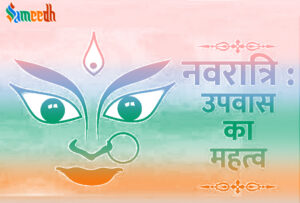Fasting during the nine-day Navratri festival in Hinduism is a religious and cultural tradition that holds deep significance.

The primary reasons for fasting during Navratri are as follows:
- Worship of the Goddess Durga: Navratri is dedicated to the worship of the Hindu goddess Durga, who is considered the embodiment of divine feminine power and energy. Fasting during this period is a way of showing devotion and respect to the goddess.
- Purification and Cleansing: Fasting is seen as a way to purify the body and mind. It is believed that by abstaining from certain foods and physical indulgences, individuals can cleanse themselves spiritually and mentally, making them more receptive to divine blessings.
- Spiritual Renewal: Navratri fasting is a time for spiritual reflection and self-purification. Many people use this period to engage in prayer, meditation, and other spiritual practices to deepen their connection with the divine.
- Austerity and Self-Discipline: Fasting requires self-discipline and self-control, which are considered virtuous qualities in Hinduism. By observing these practices, individuals aim to cultivate self-control and strengthen their willpower.
- Cultural Tradition: Navratri fasting is an integral part of the cultural traditions during the festival. It is often passed down through generations and is considered a way to maintain cultural and religious heritage.
- Celebrating the Nine Forms of Durga: Each day of Navratri is associated with one of the nine forms of the goddess Durga. Fasting during this period is a way to honor and celebrate these different aspects of the goddess.
- Community and Family Bonding: Fasting during Navratri is a community and family affair. It brings people together to share the experience and strengthens family and social bonds.
- Offering Devotion and Gratitude: Fasting is seen as a form of sacrifice and offering to the goddess. It is a way to express gratitude for her blessings and seek her protection and guidance.
- Symbolic Gestures: Certain food items, such as grains and non-vegetarian foods, are typically avoided during Navratri fasting. These restrictions are symbolic of a detachment from worldly pleasures and a focus on the divine.
It’s important to note that there are variations in the way people observe Navratri fasting. Some may choose to fast strictly by abstaining from all food, while others may follow partial fasts by consuming specific foods or eating only one meal a day. Additionally, regional and cultural differences can influence the customs and traditions associated with Navratri fasting. Overall, fasting during Navratri is a multifaceted practice that combines religious devotion, cultural significance, and personal spiritual growth.